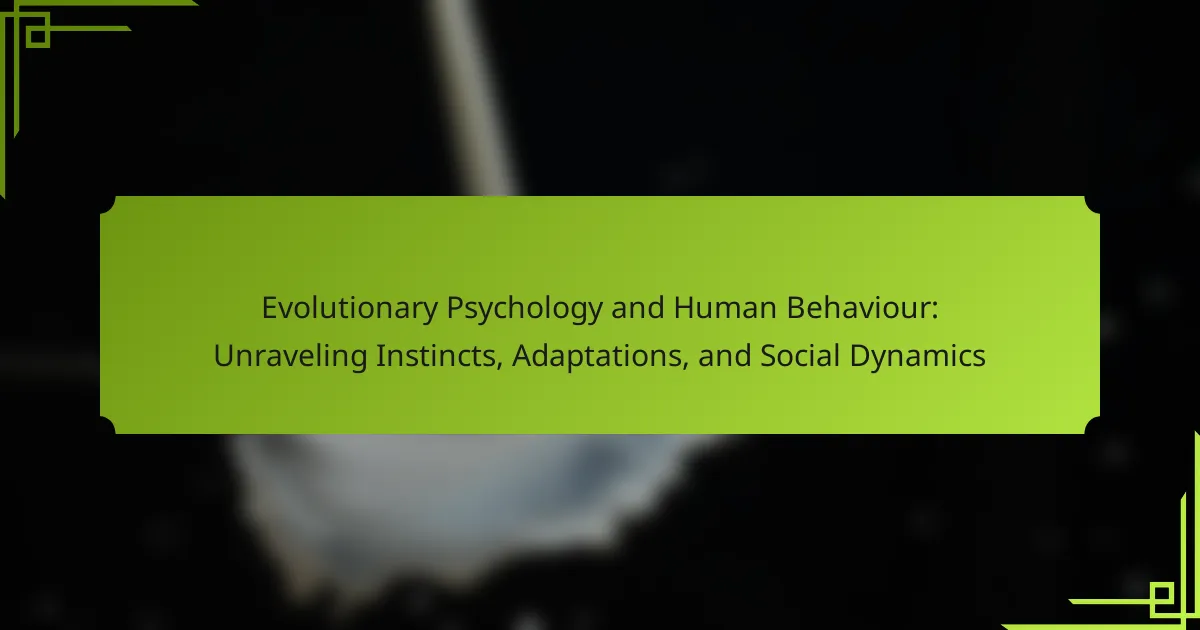Understanding evolutionary psychology can enhance personal relationships by revealing the instincts that drive human behaviour. This field examines how adaptations influence social dynamics and decision-making. It explores universal attributes like social bonding and communication, as well as unique traits such as adaptive problem-solving and advanced language development. Insights from evolutionary psychology can improve interpersonal interactions and foster deeper connections.

What is the foundation of Evolutionary Psychology?
Evolutionary psychology is founded on the premise that human behaviour is shaped by evolutionary processes. It examines how instincts and adaptations influence social dynamics and decision-making. Key aspects include natural selection, which favours traits that enhance survival and reproduction, and the role of ancestral environments in shaping modern behaviour. This field integrates insights from biology, anthropology, and psychology to explain complex human interactions and motivations.
How do instincts shape human behaviour?
Instincts significantly influence human behaviour by guiding decision-making and social interactions. Evolutionary psychology posits that these instincts are adaptations developed to enhance survival and reproduction. For instance, the instinct for cooperation fosters group cohesion, which can lead to increased resource sharing and protection. Additionally, instincts related to fear can trigger protective responses in dangerous situations, ensuring individual safety. Understanding these instinctual behaviours provides insight into the complexities of human social dynamics and interactions.
What role do adaptations play in survival?
Adaptations are crucial for survival as they enhance an organism’s ability to thrive in its environment. These traits improve reproductive success and resource acquisition. For example, physiological adaptations like camouflage help species evade predators. Behavioural adaptations, such as migration, allow species to exploit seasonal resources. The unique attribute of adaptability enables organisms to respond effectively to environmental changes, ensuring their continued existence.
What are examples of human adaptations?
Human adaptations are changes that enhance survival and reproduction. Examples include bipedalism, which allows efficient movement; lactose tolerance, enabling dairy consumption; and the development of larger brains for complex social interactions. These adaptations illustrate how human behaviour has evolved in response to environmental pressures and social dynamics.
How do social dynamics influence evolutionary processes?
Social dynamics significantly influence evolutionary processes by shaping human behaviour and adaptive strategies. Interactions within social groups affect mate selection, resource allocation, and survival tactics. For instance, cooperation often enhances reproductive success, leading to the emergence of altruistic traits. Social hierarchies and cultural norms also dictate behaviours that align with evolutionary advantages, such as group cohesion and conflict resolution. As a result, understanding these dynamics provides insight into the evolutionary psychology underpinning human instincts and adaptations.

What are the universal attributes of human behaviour?
Human behaviour is shaped by universal attributes like social bonding, communication, and adaptability. These traits stem from evolutionary psychology, which reveals instincts that enhance survival and reproduction. Social dynamics, such as cooperation and competition, further illustrate how humans navigate their environments. Understanding these attributes provides insights into collective human experiences and interactions.
How does kin selection affect relationships?
Kin selection significantly influences relationships by promoting altruistic behaviours towards genetically related individuals. This evolutionary mechanism fosters cooperation, enhancing survival and reproductive success among kin. As a result, individuals prioritise relationships with family, leading to stronger social bonds and support networks. Kin selection also shapes social dynamics, encouraging group cohesion and collective care, which are vital for communal living. These patterns illustrate how evolutionary psychology underpins human behaviour and social interactions.
What is the significance of mate selection?
Mate selection is significant as it influences genetic diversity and reproductive success. Evolutionary psychology suggests that mate choice reflects adaptive strategies for survival and offspring viability. Individuals often seek partners with desirable traits, such as health and resources, enhancing the likelihood of successful reproduction. This selection process shapes social dynamics and cultural norms around relationships. Understanding these patterns provides insight into human behaviour and instincts, revealing the underlying motivations that drive mate selection.

What unique attributes define human evolutionary psychology?
Human evolutionary psychology is defined by unique attributes such as adaptive problem-solving, social cooperation, and mating strategies. These attributes illustrate how evolutionary pressures shape cognitive functions and behaviours. Adaptive problem-solving enables humans to navigate complex environments, while social cooperation fosters group dynamics essential for survival. Mating strategies reflect evolutionary goals in reproduction and genetic success. Understanding these attributes offers insights into human behaviour across various contexts.
How do cultural factors intersect with evolutionary psychology?
Cultural factors significantly influence evolutionary psychology by shaping human behaviour and social dynamics. Cultural norms and values can modify instincts and adaptations that have evolved over time. For instance, collectivist cultures may prioritise group harmony, affecting individual decision-making processes. This intersection reveals how cultural contexts can enhance or suppress certain evolutionary traits, leading to diverse human behaviours across societies. Additionally, cultural narratives can reinforce specific adaptive strategies, impacting reproductive choices and social structures. Understanding this interplay enriches the study of human behaviour and highlights the complexity of social dynamics influenced by cultural evolution.
What is the impact of language on social interaction?
Language significantly influences social interaction by shaping communication, relationships, and cultural norms. It serves as a primary tool for expressing emotions, sharing ideas, and establishing social bonds. The evolution of language reflects human adaptations to social environments, enhancing cooperation and group cohesion. Studies show that language can affect perception and behaviour, impacting social dynamics and group identity. For instance, bilingual individuals often experience shifts in personality or perspective depending on the language used, illustrating language’s role in social contexts.

What are the rare attributes that emerge in human evolution?
Human evolution exhibits rare attributes such as increased brain size, advanced social cooperation, and complex language development. These attributes distinguish humans from other species and enhance adaptability.
Increased brain size has led to higher cognitive functions, enabling problem-solving and abstract thinking. Advanced social cooperation fosters group dynamics, enhancing survival and resource sharing. Complex language development allows for intricate communication, facilitating cultural transmission and social bonding.
These rare attributes illustrate the unique evolutionary path of humans, reflecting adaptations to environmental challenges and social structures.
How do cognitive biases reflect evolutionary history?
Cognitive biases reflect evolutionary history by influencing decision-making processes shaped by survival needs. These biases, such as confirmation bias and availability heuristic, helped early humans navigate complex environments. For instance, the tendency to favour information that confirms existing beliefs enabled quicker responses to threats. As a result, these cognitive shortcuts facilitated adaptive behaviours crucial for survival and social cohesion. Understanding these biases provides insights into contemporary human behaviour rooted in our evolutionary past.
What are the implications of altruism in human evolution?
Altruism has significant implications for human evolution, suggesting that cooperative behaviours enhance survival. Altruistic acts can strengthen social bonds, improving group cohesion and mutual support. This cooperation likely provided evolutionary advantages, allowing humans to thrive in complex social environments. Research indicates that altruistic behaviour may be rooted in genetic predispositions, influenced by natural selection to favour traits that benefit the group. As a result, altruism contributes to the development of social norms and moral frameworks, shaping human interactions throughout history.

How can understanding evolutionary psychology enhance personal relationships?
Understanding evolutionary psychology can significantly enhance personal relationships by revealing underlying instincts and social dynamics. This knowledge helps individuals recognise behavioural patterns rooted in our evolutionary past. For instance, understanding attachment styles can improve communication and emotional bonding. Recognising the evolutionary basis of jealousy can also foster empathy and reduce conflict. By applying these insights, individuals can navigate relationships more effectively, leading to deeper connections and greater satisfaction.
What strategies can improve communication based on evolutionary principles?
To improve communication based on evolutionary principles, focus on understanding innate human instincts and social dynamics. Recognising that effective communication aligns with survival and social bonding can enhance interactions.
Utilise non-verbal cues, as they often convey emotions more powerfully than words. For instance, maintaining eye contact fosters trust and engagement. Adapt language to the audience, reflecting shared experiences to create rapport.
Encourage active listening, which promotes empathy and understanding. This practice aligns with evolutionary adaptations for cooperation, enhancing group cohesion.
Finally, leverage storytelling, an ancient form of communication that resonates deeply with human nature, to convey messages effectively and memorably.
What common mistakes should be avoided in applying evolutionary psychology?
To effectively apply evolutionary psychology, avoid common mistakes such as oversimplifying complex behaviours, ignoring cultural influences, and neglecting the role of individual differences. Misinterpreting evolutionary concepts can lead to flawed conclusions about human behaviour. It’s crucial to recognise that adaptations are not solely biological; social and environmental factors also shape behaviour. Additionally, applying evolutionary psychology without considering contemporary contexts can result in outdated perspectives.
What best practices can optimize social interactions informed by evolutionary insights?
To optimize social interactions informed by evolutionary insights, focus on enhancing empathy, communication, and cooperation. These practices foster stronger connections and adaptability in social dynamics.
Understanding evolutionary psychology reveals that humans are wired for social bonding. Active listening and expressing genuine interest in others’ perspectives can strengthen relationships.
Promoting cooperative behaviours, such as sharing resources or collaborating on tasks, aligns with human instincts for group survival. This can lead to increased trust and improved social networks.
Utilizing nonverbal cues effectively enhances interaction quality. Body language, facial expressions, and eye contact play crucial roles in conveying emotions and intentions.
